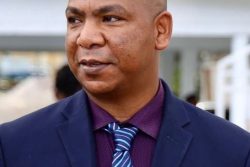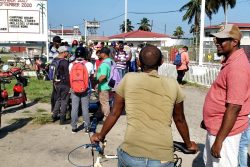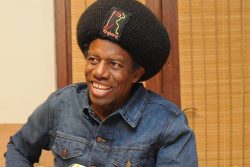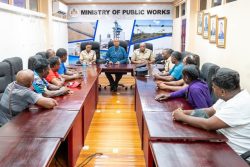Dear Editor,
Saturday’s afternoon programme at the Theatre Guild featured a lecture by Professor Marjoleine Kars of her book- ‘Blood on the River,’ which in essence was an examination of the most significant revolution in Guyana. A rebellion by the enslaved Africans, led by Cuffy referred to as Governor Cuffy, against the Dutch enslavers. Those events, delightfully presented by the Professor, shaped the Guyana we know today. It is the sort of information and education that provides a necessary key to unlock the doors of misinformation, and prejudice, if as a people, we are to overcome ignorance and past missteps to allow us to march bravely into the sunlit, but complex and sometimes confusing world.
An event which ought to be shared by thousands of students, elders, political, social and religious leaders. In my final paragraph of this letter, I will identify a recurrent problem, some may say a curse which we must face bravely and boldly. Let me first thank Mr. Malcolm de Freitas, Director of the Theatre Guild for appropriate protocol and other arrangements. Second, to thank IDPADA-G for overcoming the failure to secure the expected traditional grant yet putting together the event. Also, to compliment the Law Firm of Hughes Fields & Stoby for sponsoring the visit of Professor Kars.
I hope that other professional groups, businesses and entities would come forward, so that we can help shine a light to pierce a darkness that is evident in the Republic. It was a useful thought provoking evening embellished with songs, videos, soloist, Russell Lancaster accompanied by Marilyn Dewar, Prize/Giveaways along with the introduction of the Guest Speaker by Mr. Nigel Hughes. I was happy to observe the presence of former President of the Republic Donald Ramotar, former Attorney General, Basil Williams and former Ministers of Government, Clement Rohee and Ronald Bulkan,
Professor Kars explained that Cuffy took control of the territory, we now know as Berbice, but seemed to have no difficulty sharing power with his erstwhile masters, the Dutch. Due to disagreements with his main Lieutenant, Atta, the Dutch were able to mobilise assistance externally and internally, and the revolution crumbled and failed. Consistent with the culture of his tribe, Cuffy chose the honourable way out by taking his life, the rest is history. At question time, Professor Kars, was asked why the Amerindian population supported the Dutch and not the African revolutionaries. She explained that the Europeans understood the need to cultivate and gain the support of the Amerindian community through the use of their wealth and other means, not available to Cuffy and his brave men. She explained the utility of divide and rule. A technique that some feel is on display to this day.
In a country, where I believe there is no deep historical racism, this is a lesson we should learn and not repeat. Here I make a subtle distinction between racism and ethnic suspicion, distrust and the fear of domination of one group over another. This is important in the case of our country, where during slavery, the imperial master-class ensured the creation of a group, we unhappily refer to as the House Slave. Additionally, both the Dutch and British plantocracy paid our Amerindian brothers to hunt and catch slaves who ran away from the horrors and beatings of plantation life.
Of interest, not all Amerindians were made to be headhunters by the Europeans. Some accommodated run-away slaves and as I travelled around this country, more than half a century ago, I witnessed evidence of this delightful mixture, we call ‘bouvianders’s in every river I traversed. This divide and rule policy has been practised in South America, North America, Central America and elsewhere. The master class features change from time to time, but the practice of divide and rule remains deep stains on our society and sometimes, we fight among ourselves, blinded to the machinations of the philosophy of those in charge who learn quickly by using money and other incentives to divide and rule.
For me, this was a lesson not to be ignored after the Professor replied to the question, of why did the Amerindians support the Dutch against the African Freedom Fighters. If this or any other Administration is truly interested in harmony, in love, peace, and oneness, we should learn from the mistakes and experiences that took place and encourage the reading and therefore interpretation of events that can made us glorious and not damned. In conclusion, I am reminded of some of the spiritual and intellectual values to which African ancient societies were tethered:
1. Cherish study, avoid the dance; 2. Do not be arrogant about your knowledge, but take advice from the ignorant as from the wise; 3. Great is justice, lasting its effects; 4. Write diligently by day, recite at night; 5. I have caused no weeping, I have not killed; 6. I have given no order to kill, I have caused no one pain; 7. I have not taken milk from the mouths of babes; 8. I have not retained water when it was time for it to flow. These values were the philosophical underpinnings of ancient African societies, values that informed the systems of governance, science and economics.
Sincerely,
Hamilton Green
Elder




